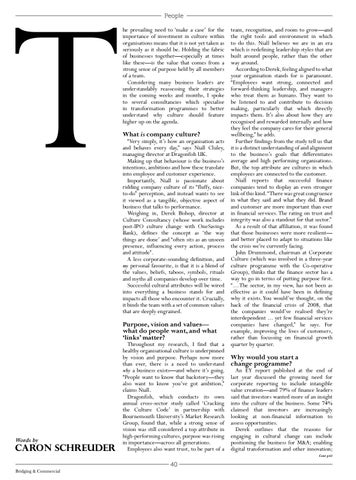People
he prevailing need to ‘make a case’ for the importance of investment in culture within organisations means that it is not yet taken as seriously as it should be. Holding the fabric of businesses together—especially at times like these—is the value that comes from a strong sense of purpose held by all members of a team. Considering many business leaders are understandably reassessing their strategies in the coming weeks and months, I spoke to several consultancies which specialise in transformation programmes to better understand why culture should feature higher up on the agenda.
What is company culture?
“Very simply, it’s how an organisation acts and behaves every day,” says Niall Cluley, managing director at Dragonfish UK. Making up that behaviour is the business’s intentions, ambitions and how these translate into employee and customer experience. Importantly, Niall is passionate about ridding company culture of its “fluffy, niceto-do” perception, and instead wants to see it viewed as a tangible, objective aspect of business that talks to performance. Weighing in, Derek Bishop, director at Culture Consultancy (whose work includes post-IPO culture change with OneSavings Bank), defines the concept as ‘the way things are done’ and “often sits as an unseen presence, influencing every action, process and attitude”. A less corporate-sounding definition, and my personal favourite, is that it is a blend of the values, beliefs, taboos, symbols, rituals and myths all companies develop over time. Successful cultural attributes will be wired into everything a business stands for and impacts all those who encounter it. Crucially, it binds the team with a set of common values that are deeply engrained.
Purpose, vision and values— what do people want, and what ‘links’ matter?
Words by
caron schreuder
Throughout my research, I find that a healthy organisational culture is underpinned by vision and purpose. Perhaps now more than ever, there is a need to understand why a business exists—and where it’s going. “People want to know that backstory—they also want to know you’ve got ambition,” claims Niall. Dragonfish, which conducts its own annual cross-sector study called ‘Cracking the Culture Code’ in partnership with Bournemouth University’s Market Research Group, found that, while a strong sense of vision was still considered a top attribute in high-performing cultures, purpose was rising in importance—across all generations. Employees also want trust, to be part of a
team, recognition, and room to grow—and the right tools and environment in which to do this. Niall believes we are in an era which is redefining leadership styles that are built around people, rather than the other way around. According to Derek, feeling aligned to what your organisation stands for is paramount. “Employees want strong, connected and forward-thinking leadership, and managers who treat them as humans. They want to be listened to and contribute to decision making, particularly that which directly impacts them. It’s also about how they are recognised and rewarded internally and how they feel the company cares for their general wellbeing,” he adds. Further findings from the study tell us that it is a distinct understanding of and alignment to the business’s goals that differentiates average and high performing organisations. But, the top attribute are cultures in which employees are connected to the customer. Niall reports that successful finance companies tend to display an even stronger link of this kind. “There was great congruence in what they said and what they did. Brand and customer are more important than ever in financial services. The rating on trust and integrity was also a standout for that sector.” As a result of that affiliation, it was found that those businesses were more resilient— and better placed to adapt to situations like the crisis we’re currently facing. John Drummond, chairman at Corporate Culture (which was involved in a three-year culture programme with the Co-operative Group), thinks that the finance sector has a way to go in terms of putting purpose first. “…The sector, in my view, has not been as effective as it could have been in defining why it exists. You would’ve thought, on the back of the financial crisis of 2008, that the companies would’ve realised they’re interdependent ... yet few financial services companies have changed,” he says. For example, improving the lives of customers, rather than focussing on financial growth quarter by quarter.
Why would you start a change programme?
An EY report published at the end of last year discussed the growing need for corporate reporting to include intangible value creation—and 79% of finance leaders said that investors wanted more of an insight into the culture of the business. Some 74% claimed that investors are increasingly looking at non-financial information to assess opportunities. Derek outlines that the reasons for engaging in cultural change can include positioning the business for M&A; enabling digital transformation and other innovation; Cont p44
40 Bridging & Commercial


